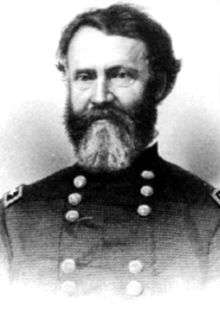Alexander Brydie Dyer
| Alexander Brydie Dyer | |
|---|---|
 Alexander Brydie Dyer | |
| Born |
January 10, 1815 Richmond, Virginia |
| Died |
May 20, 1874 (aged 59) Washington, D.C. |
| Place of burial | Arlington National Cemetery |
| Allegiance |
United States of America Union |
| Service/branch |
United States Army Union Army |
| Years of service | 1837 - 1874 |
| Rank |
|
| Unit | 3rd U.S. Artillery |
| Commands held | Chief of Ordnance of the U.S. Army |
| Battles/wars |
Seminole Wars |
Alexander Brydie Dyer (January 10, 1815 – May 20, 1874) was an American soldier in a variety of 19th century wars, serving most notably as a general and chief of ordnance for the Union Army during the American Civil War.
Biography
Dyer was born at Richmond, Virginia, and graduated from the United States Military Academy in 1837 as 6th our of 50 cadets.[1] He served in the Seminole Wars 1837–38 in the 3rd US Artillery and as lieutenant of ordnance. In the Mexican-American War in 1846–48 he was brevetted captain for gallant conduct at the Battle of Santa Cruz de Rosales. He was promoted to full Captain in the ordnance department on March 3, 1853. Between the wars Dyer was in command of Fayetteville Arsenal (51-53), Little Rock Arsenal (53-55) and Fort Monroe Arsenal (55‑61), while he also was a member of the Ordnance Board in 1859.[1]
When the Civil War erupted Dyer stayed with the Union, and in August 1861 he was given command of the Federal armory in Springfield, Massachusetts; where his expansions and enlargement of operations gained notice.[1] On September 13, 1864, he was appointed chief of ordnance at Washington, D.C., with the rank of Brigadier General, U.S. A., to rank from September 12, 1864.[2] President Lincoln submitted the nomination to the U.S. Senate on December 12, 1864 and the Senate confirmed the appointment on February 23, 1865.[2] Dyer held the position on May 30, 1864.[3] Dyer is known as being the first commander committed to the purchasing of a Gatling gun, one of the first designs of a machinegun.[4] He is also known as the creator of the Dyer Shell, an artillery projectile for the 3-inch rifled ordnance-gun. During the last year of the war Dyer demanded, and got, a court of inquiry that cleared him of any wrongdoing or harmful partisanship he was accused of by a long row of charlatan inventors and knavish contractors including former colonel Hiram Berdan.[1] On March 8, 1866, President Andrew Johnson nominated Dyer for appointment to the brevet grade of major general of the Regular Army to rank from March 13, 1865, and the U.S. Senate confirmed the nomination on May 4, 1866 and re-confirmed it on July 14, 1866 in order to have line officers precede staff officers in rank.[5]
After the war Dyer stayed in the army and continued his service as head of the ordnance department till his death on May 20, 1874 in Washington. He was buried in Arlington National Cemetery and survived by his wife Elizabeth Beersheba Dyer (née Allen) and his six children.[6] Of note is his son, Colonel Alexander Brydie Dyer, jr., West Point class of 1873; as the author of the Handbook for Light Artillery.[7]
See also
Notes
- 1 2 3 4 Cullum, G.W.; Biographical Register of the Officers and Graduates of the U S Military Academy at West Point, N Y, 3rd Edition; 1891, pp. 664
- 1 2 Eicher, John H., and Eicher, David J., Civil War High Commands, Stanford University Press, 2001, ISBN 0-8047-3641-3. p. 716
- ↑ Eicher, 2001, p. 220
- ↑ Chivers, C.J.; The Gun; Simon and Schuster, 2010; ISBN 0-7432-7173-4
- ↑ Eicher, 2001, p. 707
- ↑ "Alexander Brydie Dyer". Find a Grave. Retrieved 2014-02-09.
- ↑ Dyer, A.B.; Handbook for Light Artillery; John Wiley & Sons; New York; 1896
References
- Eicher, John H., and Eicher, David J., Civil War High Commands, Stanford University Press, 2001, ISBN 0-8047-3641-3.
External links
"Alexander Brydie Dyer". Find a Grave. Retrieved 2014-02-09.